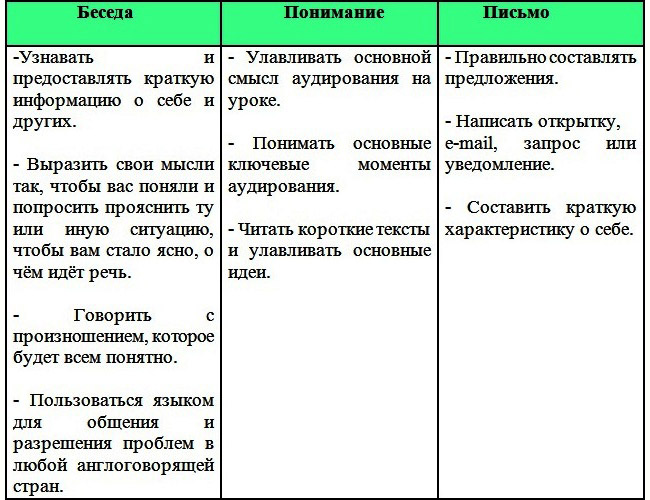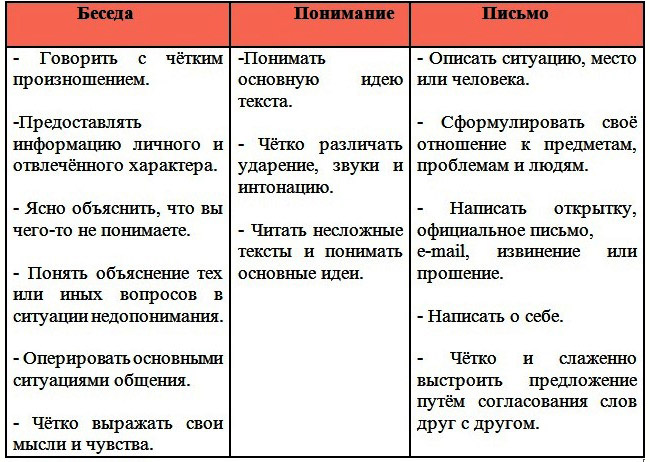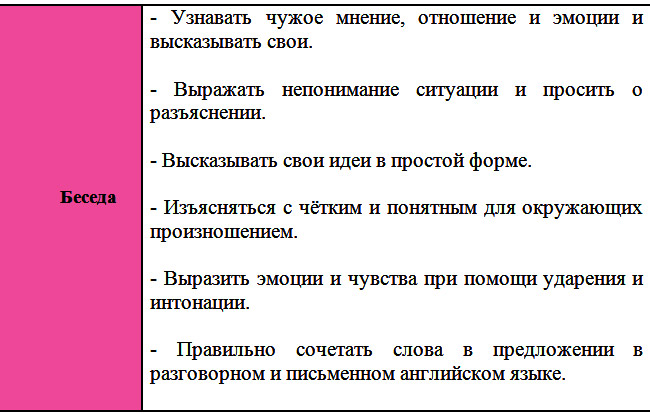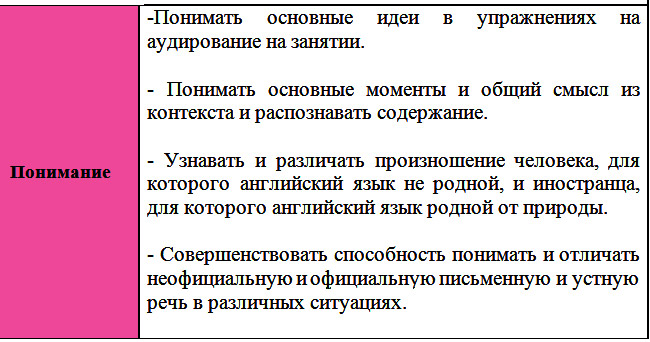International levels of English. What are the levels of knowledge of English
Did you know that 8 out of 10 people who start learning a language have the wrong idea about their level of English? Someone tends to exaggerate it, someone, on the contrary, underestimate it.
Because of this, you either take material that is too difficult for you, leaving gaps in knowledge, and eventually get confused. Or you start learning what you already know, wasting your time.
Only a real understanding of your strengths allows you to correctly draw up a training program, and therefore, make your classes more effective.
In the article, I will give you a clear understanding of what levels of English proficiency are, how to determine your level, and what level you need to reach.
So, let's begin.
6 levels of English proficiency

I want to start by saying that knowledge of any language is assessed according to the following proficiency criteria:
- Knowledge of grammar and vocabulary
- Ability to speak English
- Ability to express thoughts in writing
- Ability to understand spoken language
- Ability to understand language while reading
That is, on different levels proficiency you must be able to read and write, understand speech and speak English, but within the material of these levels (that is, using the words and grammar that you know).
There is an international level system in English. According to her, there are 6 levels of English proficiency.
I'm sure you're familiar with them, but let's look at them again.
1.Beginner (First level)
This is the level of people who are just starting to learn the language, or have studied it a long time ago and at a low level. At this level, a person knows the alphabet, basic reading rules, words and simple expressions.
2. Elementary (elementary level)
The name speaks for itself. At this level, you can use elementary constructions and phrases, simple tenses (Present Simple, Past Simple, Future Simple, Present Continuous, Past Continuous, Future Continuous), communicate on familiar topics.
3. Pre-Intermediate(below the average)
You can communicate, hold a conversation, build more complex sentences and use more complex tenses (Present Perfect, Past Perfect, Future Perfect).
4. intermediate (average level)
At this level, you understand English, express yourself fluently, and know all tenses.
5. Upper Intermediate(higher than average)
You easily communicate on everyday topics, calmly understand what they say to you, know all the nuances of using tenses.
6. Advanced (advanced level)
You understand English speech, you know grammar, you can think and speak it as if it were your native language.
How to determine your level?
How to determine your level of English proficiency?

To determine your real level of proficiency, you need to pass a test in which you will determine the level of all those criteria that I mentioned above.
Important point: You have seen or taken English tests more than once, where you have to choose one correct answer from several. They are very common, but such tests will not help you in any way in determining the level of English proficiency. Perhaps you will answer all the questions perfectly, thereby showing that you know the theoretical part (grammar) very well.
Checking your level of language proficiency includes not only a test of knowledge, but also a test of skills. And the online test will not determine practical skills: writing, reading, speaking and listening.
A correct leveling test should include the following items:
1. Knowledge of grammar
Grammar is the rules by which words are linked into sentences. It includes: knowledge of all tenses in English and the ability to coordinate them, all parts of speech and the nuances associated with their use.
2. Vocabulary
This is how many words you have in your "baggage". It consists of words that you can understand by listening and reading, and which you yourself use when speaking.
That is, determining how quickly and correctly you can read English texts and understand the meaning of what you read.
4. Listening
You must be able not only to catch incoherent words, but to be able to understand the whole speech: in the right time and with meaning.
5. Ability to speak
You may know grammar and vocabulary well, but not be able to use this knowledge in a conversation at all. It is this skill that is tested in this paragraph.
By the way, our managers at English courses in Moscow will help you determine the level for free. This will allow you to accurately know the level, because our test includes all these items and consists not only of written tasks, but also of oral communication with the manager in English.
Another question that learners often ask is to what level you need to learn a language.
To what level should you learn English?
Of course, this is determined depending on the purpose of the study, that is, on where you will apply your knowledge. Naturally, the higher your level, the freer you feel and the easier you can use the language.
For example, if you need a language to negotiate with foreign partners, then your English should be at the advanced level.
If you are learning English in order to communicate fluently while traveling, then an intermediate level will be enough for you.
By the way, the intermediate level is the golden mean and the minimum level to which you should learn English?
Intermediate level or "point of no return" in English
We all know that if you don't use English, you will forget it.
However, if during the course you:
- Learn to use the rules
- All the material covered is well practiced in use
- Fix the material and repeat it
- Exercise regularly
Then, having reached the intermediate level (average), you will reach the “point of no return”. What does it mean?
Even if you do not use English, your level will not "roll down" to zero. You will have a base that you will not forget.
Why is this happening?
By learning English up to this level, you will:
- Understand the structure of the language (how tenses are formed)
- Repeat the material so many times that you definitely won’t forget the basic rules.
Therefore, you will remember English even if you do not use it for a long time.
That is why intermediate is the minimum to which you must reach when learning a language.
I wish you success in your studies, no matter what stage you are at now. After all, the most important thing is your desire to learn the language and develop the knowledge already gained.
This applies only to those who know absolutely nothing about the language, even the alphabet. If you studied English at school or, then this is definitely not about you. Given the prevalence of the English language, it is difficult to find an adult who would have an absolute zero level.
Elementary Knowledge, 1 Elementary
Unfortunately, this is the level of those who studied English at school. A person knows a few simple words, has a vague idea of grammar, but he cannot speak. With a certain diligence and sociability, possession of elementary knowledge will allow you to communicate with the seller in the store or the staff at the hotel, but nothing more.
Advanced Elementary, 2 Upper-Elementary
A person at this level can speak using the simplest grammatical structures. Vocabulary is limited to topics that have been studied in the classroom, but this is already enough to keep the conversation going on a familiar topic. It's hard to express your opinion though. You can communicate at this level if the interlocutor speaks slowly and supplements his words with gestures.
Slightly below average, 3 Pre-Intermediate
With this level of proficiency, a person can carry on a conversation on a familiar topic with ease. He speaks with almost no mistakes, the pace of speech is already quite decent. But when communicating with native speakers, it often arises a difficult situation. An English-speaking person decides that his interlocutor speaks well, and begins to communicate in “normal mode”, and here a person with a Pre-Intermediate level realizes that he still understands little, usually feeling awkward at the same time.
Intermediate, 4 Intermediate
This is good knowledge. A person can speak quite fluently on everyday topics, knows grammar, can explain himself in writing. Vocabulary is still, as a rule, low. This level allows you to take international tests IELTS for 4.5-5.5 points, and TOEFL - for 80-85.
Advanced Intermediate, 5-6 Upper-Intermediate
Upon reaching this level, a person can already enter a university or work in a foreign company if you do not need to communicate too much with clients. The test results are as follows: IELTS 5.5-6.5, TOEFL 100.
Advanced. 7-9 Advanced
This is already excellent knowledge of the language, and further differences in everyday communication cannot be noticed. You can work in any position or study at any university. Test results: IELTS 7.0, TOEFL 110.
Level 10-12 is considered even higher. This knowledge of the language, like a native highly educated resident of the UK. This is called perfect language proficiency. IELTS score is 8.5.
When considering the accepted levels of foreign language proficiency, it is impossible to establish a clear framework. No teacher will tell you that learning 15-20 more lexical items will take you to the next level. Note that language proficiency is not only vocabulary, active and passive vocabulary. If you have successfully passed the Intermediate exam, then in your notepad of achievements you can note that true knowledge is at the Upper-Intermediate level (the initial stage of the level).
If you have not had to deal with the level division of the English language before, it is likely that when you try to establish the truth on your own, you will face a chaos of definitions and requirements.
To give a small example, almost everyone who undertook to study English is well acquainted with Murphy's English Grammar In Use, designed for students Intermediate level, however, the information obtained will be enough to pass the FCE exam. Courses to overcome this barrier and obtain a certificate prepare students at an advanced level.
The conclusion from the above will be the following - there are several classifications that are reflected in each other.
General Scale of ALTE Organization
ALTE has received accreditation from the European Commission for Education, therefore, without a doubt, it can be considered a reliable and verified source. The accepted scale consists of six levels from A1 to C2, this gap is enough to cover knowledge from basic to perfect proficiency in English.
It is necessary to focus on this scale for those who plan to take the Cambridge exams. In addition, she is the vector of British publishers of reference books, dictionaries and various kinds of grammar books.
Popular educational courses that provide basic knowledge, such as Headway, Top Notch, Cutting Edge, True Colors and Reward offer their own scale of six levels:
- Beginner or Basic
- Elementary
- Pre-Intermediate
- intermediate
- Upper Intermediate
- Advanced
From the table, it is easy to conclude that the Advanced level, which is offered in almost all conversational courses, corresponds only to the average level of knowledge when obtaining certificates. If your plans include studying at foreign universities, no one will purposefully check your level of knowledge, you will be asked to present the results of TOEFL, IELTS, which, in turn, fully coincide with ALTE.
FCE and CAE
FCE and CAE- Cambridge exams, preparation for which lasts at least a year and involves the achievement of a qualitatively new level in knowledge foreign language. The highest level, which proves that you speak English as a native language, is the Certificate of Proficiency in English.
His graying level is Post-Proficiency, those who manage to reach such heights rarely make mistakes in the use of a foreign language, for example, subtle English humor based on quoting a book, film or TV show escapes them. This completes the gradation, and the student of the course receives the title of "native English speaker".
What to know and be able to

Beginner level

Elementary level

Level Pre-Intermediate
Intermediate level



Upper Intermediate Level




